Today there are more choices than ever when it comes to choosing a content management system for your website project.
WordPress is a great platform, but it really isn’t the right solution for every project. There may be all kinds of reasons you’d look for an alternative to WordPress: ease-of-use, functionality, technical level, features, and more.
When it comes to problems, it’s a good one to have, but it’s not always been that way.
I remember trying to get started with my first website years ago. It was a formidable task to say the least; I didn’t know what I didn’t know. But after experimenting with a few different options, including trying to build my own system, I eventually settled on WordPress 2.5, and fell in love with it.
The right content management system really depends on what your end goal is. If you’re just getting started with a website, your needs can be a lot different than someone who’s looking to redesign their site who’s got a lot of experience working with web content platforms.
There are some really intriguing options here, so try out a couple as you make your plans for your web project.
Here are 21 different WordPress Alternatives
Blogger

Blogger is one of the platforms that has endured the test of time. Blogger is a free hosted service that is one of the many apps by Google.
Blogger has a limited set of features but does a small selection of themes from which to choose if you want to go for a look that is customized. It does not allow for custom theming
Like other services, Blogger allows their users to register a subdomain for blogspot.com and they can upgrade to a premium domain for a small fee so they don’t end up with the dreaded subdomain look.
Being that it’s a Google property, it integrates with Adsense easily and allows creators to monetize their blog. As Adsense is easily intergrated, so is Google Analytics so you can dig in to the details of what visitors are doing on your site.
This is a great basic starting place for beginning bloggers to get used to working with a blog, but probably isn’t the best fit for pros who are looking for deeper control and functionality.
- Technical level: beginner
- Hosted vs. self-hosted: hosted
- Cost: free with upgrade options
Concrete5
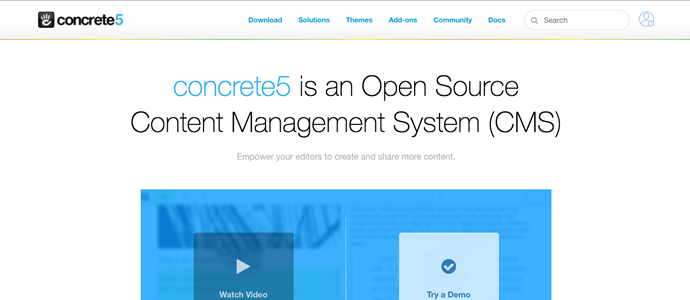
Concrete5 is an open source content management system focused on building a great experience for content creators and managers who don’t have a lot of technical skill.
Fully customizable with themes and add-ons, Concrete5 provides a robust solution for those that are looking for more than just simple blogging capabilities.
With intuitive editing and content management capabilities, this powerful CMS is built with mobile-responsiveness in mind with a variety of tools and features that can be used to build really powerful sites.
There are robust user and developer communities that provide a wide range of documentation and support options, and it’s known as one of the best CMS platforms for designers.
- Technical level: intermediate to advanced
- Hosted vs. self-hosted: self-hosted
- Cost: open source, MIT license
Craft CMS
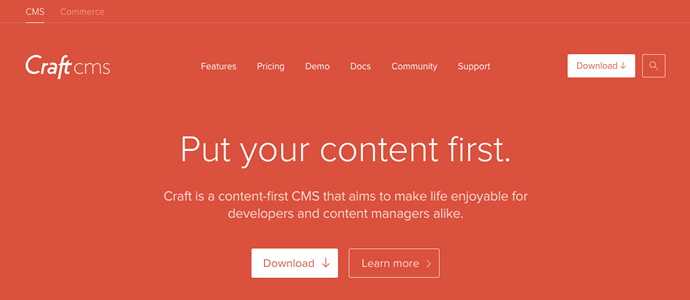
Built with developers and web professionals in mind, Craft CMS focuses giving you just enough of what you need to get going, then the ability scale to build big, powerful websites.
Developers can build out custom content types just the way they want with the power of highly configurable fields that can do just about anything you need them to do.
Built also with content managers in mind (the end users of the sites that web developers build) Craft CMS makes working with content easy and intuitive with a fantastic dashboard and publishing tools.
Developers will also like their lightweight and streamlined approach to theming, code bloat, and other developer-friendly approaches.
- Technical level: advanced
- Hosted vs. self-hosted: self-hosted
- Cost: Free personal site version, with $199 and $299 options
Drupal

Drupal is not so much a content management system, as it is a content management framework on which to build your content management system.
Drupal is a powerhouse system that is as flexible, adaptable, and scalable as any system on this list.
Developers have the ability to create any kind of content types they want from simple to complex. Just about anything you can think of can be built with Drupal.
The analogy I like to use with Drupal is this: Content management systems can be like Lego building blocks. You can go to any toy store and get different kits that will help you build different things – airplanes, cities, buildings, along with cars and trucks of various kinds. Most content management systems are like those kits – they help you achieve a very specific process.
Drupal on the other hand, is like that giant bucket of Lego pieces, but no kit. The bucket contains everything you could need to build any single one of those kits, but doesn’t assume you want to build any of them, so it provides you all the pieces you could possibly need and then you can go build whatever you want with your giant bucket of building blocks.
- Technical level: advanced
- Hosted vs. self-hosted: self-hosted
- Cost: free open source, GPLv2
ExpressionEngine
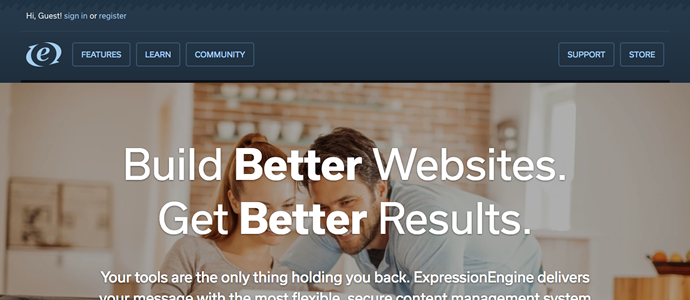
Expression Engine is much more than just a blogging platform. It’s much more comparable in terms of features and capabilities to WordPress and is more of a content management system than anything else.
It was built with the idea that it could handle complex content needs without sacrificing usability or becoming overly complex as some CMSs have.
ExpressionEngine provides a robust set of features and tools that enable site owners to create basic and complex features. Features can be extended by an equally robust set of available features to build a super-high quality, professional site that can do virtually anything you need it to do.
ExpressionEngine is a self-hosted platform, so you’ll need your own hosting service to deploy it. ExpressionEngine Core is a free version that can be used for small non-commercial projects, and it’s a great way to get a feel for the full version to see if will work for your bigger project.
ExpressionEngine CMS is the full version of the self-hosted platform, and is $299.
- Technical level: intermediate
- Hosted vs. self-hosted: self-hosted
- Cost: Free version for non-commercial projects, full version $299
Ghost

Ghost got its start by focusing on a return to basics – blogging. The creators of the platform thought that other platforms like WordPress, had become too complicated. Too many features. It could do too many things. It had lost it’s focus on simply being an awesome publishing platform.
That’s where Ghost steps in. The main focus of Ghost is to provide a return to elegant simplicity – a return to publishing.
If your goal is to blog, and publish content the simplicity with which Ghost approaches content creation may be very attractive to you.
If you’re thinking that you want to scale this into a full-fledged content management system, then this is not the right choice.
The future of Ghost as a blogging platform is very bright and it enjoys a broad user base with companies like Zappos, Square, and Mozilla on board.
Ghost, like WordPress, has two different options: a self-hosted version that’s available for download and deployment on your own hosting server, or a managed pro service that covers everything you need for your blog.
- Technical level: Beginner to intermediate
- Hosted vs. self-hosted: hosted (beginner) and self-hosted (intermediate)
- Cost: hosted starts at $19 per month, there is no charge for the self-hosted version
Grav
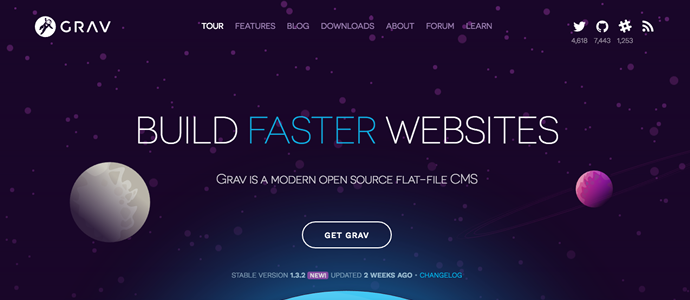
Grav is an interesting approach to CMS. Instead of using a database which is the approach of many CMS platforms, Grav utilizes a flat file system where content is stored in files rather than a database. This makes a lot of things far easier to work with, including migration if you decide that you want to move to hosts.
With features that will compare favorably to more robust content management systems like custom content types, Github integration, solid documentation, and a strong community, Grav can be a nice choice for your next web project.
Built by the theme-building powerhouse, RocketTheme, Grav was named “Best Open Source CMS of 2016” which is a big accomplishment for a newer platform.
- Technical level: advanced
- Hosted vs. self-hosted: self-hosted
- Cost: free open source MIT license
The Grid
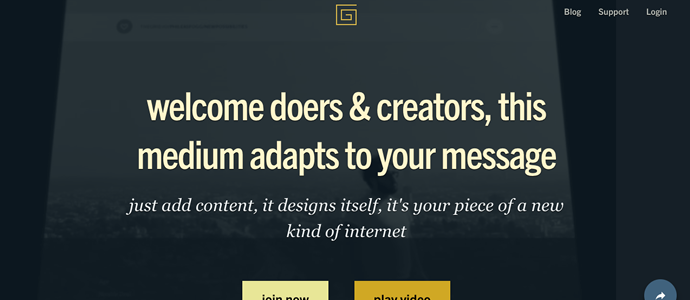
The Grid may be the most unique among all these different systems on this list. The idea is that the Grid will use artificial intelligence to build your site. The theory is that you worry about creating your content, and let The Grid handle everything else from design colors and fonts, to how it displays images, how it displays content, etc.
Anyone else hearing the Matrix soundtrack in their heads? But it’s still intriguing, am I right?
When you use this platform you’re surrendering control to The Grid’s AI robot named Molly. For a lot of people this may be a dream come true. For others, not being able to control the elements on your site may be more of a nightmare to give up that kind of control. I know it would be for me.
The Grid is a premium premium hosted platform that starts at $144 per year, and like a lot of the other premium platforms mentioned here, they provide direct support, so you have the platform creators as the ones who you lean on when you need help.
- Technical level: beginner
- Hosted vs. self-hosted: hosted
- Cost: starts at $144 per year
Jekyll

With features like pages, posts, custom layouts, permalinks, and categories, one would be tempted to think that Jekyll is another MySQL database driven content management system like so many others.
That would a faulty assumption. Jekyll is a static blog generator that uses some very simple tools as a lightweight alternative to WordPress.
Jekyll takes advantage of its lightweight structure to provide outstanding speed for its sites. Because there is no database, nor any complex functions running on the server side, Jekyll is very stable, and has a lot less security concerns.
This one however, is not really a tool for those new to getting started with their site. It runs via the command line interface, so in its most basic form, there is no dashboard to speak of.
If you’re a developer with some curiosity and time to invest in building your site, this might be a good choice for you.
- Technical level: advanced
- Hosted vs. self-hosted: self-hosted
- Cost: open source, MIT license
Joomla!

Joomla is one of the old standards when it comes to CMS and for good reason. It’s a powerful CMS with all the features you could want.
Like most others here, Joomla is built with PHP and MySQL, and can run on most any webhost. It’s also open source which means that it’s free and highly extensible.
Joomla has a variety of themes, and plugins, both free and premium, so you will have lots of options when it comes to functionality, and the look and feel of your site.
Joomla also provides the ability to work with multiple user and permission levels, and multiple content types, making working with content intuitive.
- Technical level: advanced
- Hosted vs. self-hosted: self-hosted
- Cost: free open source GPL license
Medium

Medium has really caught on as a platform. Created by Biz Stone and Ev Williams, who also created Twitter, it’s being used by some huge names, like Gary Vaynerchuk and Jason Fried, and takes a democratic approach to content.
According to Chloe Mason Gray on the Kissmetrics blog, Medium “seeks to give a voice to people who have something interesting to say, even if they don’t have thousands of Twitter followers, an active blog or friends in the right places. Medium is built to reward content for its quality, not for the pedigree or popularity of the author.”
Kinda cool, right?
Medium is not really a blog as you would traditionally understand it, but more like a platform where you can express your ideas in a social and community-driven kind of way.
Plugins and themes aren’t an issue. It works fantastically across all device sizes, and it’s a completely hosted platform, so there isn’t really any extensibility to speak of as you would find with other tools like WordPress.
It’s a free platform but also has an upgrade option available too that provides access to some exclusive members-only content.
If you’re a writer, and you just want to get your ideas written down and published, Medium is a great option for you.
- Technical level: Beginner
- Hosted vs. self-hosted: hosted
- Cost: Free with $5 per month upgrade available
Movable Type
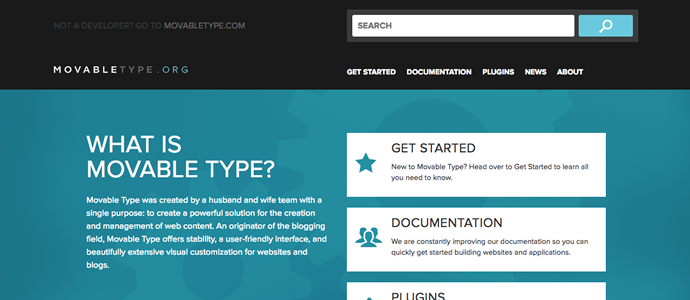
One of the originators of blogging platforms, Movable Type is a powerhouse publishing platform. Movable Type has a lot of similar types of features that you find in WordPress like the ability to create and manage categories, pages, posts, and users, along with the ability to manage multiple blogs, should you desire to do so.
If Typepad is aimed at a less-technically inclined crowd who wants a straight-forward publishing system, Movable Type is the big hitter for those looking for a more robust system.
At one point in time, Movable Type was a big-time competitor with WordPress. However, decisions regarding the licensing and philosophical approach drove Movable Type away from the free and open source approach to the proprietary approach they’re using now, so you’ll have to buy a license to use it.
It’s also self-hosted and should be compatible with most modern hosting platforms. If you prefer the hosted route, then you should probably look at Typepad above.
- Technical level: intermediate
- Hosted vs. self-hosted: self-hosted
- Cost: $499 per year if using AWS microinstance, or starts at $999
PageCloud

PageCloud is another website builder type application, similar to Wix. PageCloud is a drag and drop website builder, focused on giving non-technical users a way to build sites the way they want to have it built without having to know backend coding.
PageCloud provides the capability of building your own design. It’s loaded with tools to help you build your site, like a font library that’s full of web-ready fonts to use on your site, and an assortment of other tools to give you control over your experience.
If you don’t want to design your own theme, then you have several pre-built themes to choose from. Either use them as they are, or use them as a starting place for your own custom design.
With lots of integrations and expansion capabilities, PageCloud can be a good solution for those with little to no technical experience for building their own website.
- Technical level: Beginner
- Hosted vs. self-hosted: hosted
- Cost: free trial then starts at $20 per month
Perch
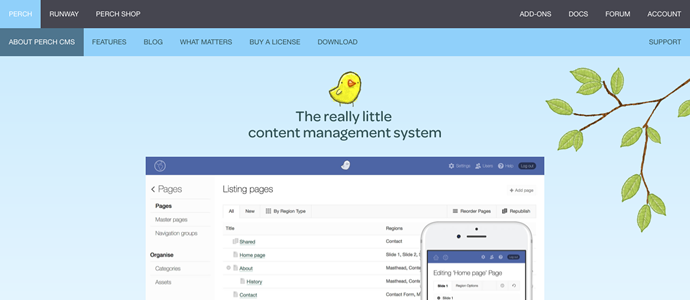
Perch is a lightweight, full content management system that’s pointed at developers and designers to use to build sites for clients. The focus for Perch is to build a really light-weight, easy-to-manage, content management framework that’s not just limited to blogging. It’s designed to provide streamlined but powerful content management tools for professional sites.
Perch makes theming easy by giving developers a lot of control over how they implement their design, and can even use frameworks like Bootstrap, or my personal favorite, ZURB Foundation.
Working with content is greatly simplified for content managers due to Perch’s streamlined control panel and intuitive tools. Getting up to speed on how to use all the tools Perch provides is one of the biggest reported perks when using this system.
Perch is a proprietary system, like others on this list. It’s also self-hosted.
- Technical level: intermediate to advanced
- Hosted vs. self-hosted: self-hosted
- Cost: $69 per site
Squarespace

One of the biggest competitors to WordPress to arise in recent years is Squarespace. It’s a hosted platform that has a lot of flexibility and scalability and can be a great solution for someone who’s looking at getting started simple on a hosted platform, and wanting to put together a basic site.
Squarespace is more a content management system, than a straight-forward blogging platform, although you can certainly blog there.
Squarespace is widely known and recognized for its great design work. Their own site by itself is a fantastic example of their design chops.
This is a great platform for beginners who want to start on a pro platform with an eye for the future.
Squarespace is a proprietary hosted platform though, and with that come the normal concerns. It does not enjoy the robust open source development community that WordPress does. But they do provide fantastic support and they power a number of high-profile sites like Lyft’s blog, Michigan | Nike, and Airwalk.
- Technical level: beginner to intermediate
- Hosted vs. self-hosted: hosted
- Cost: starts at $8 per month with free trial
Svbtle
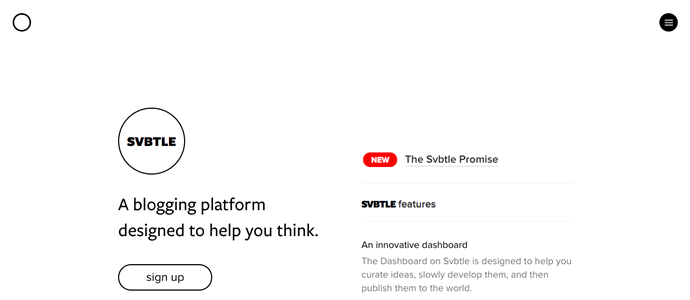
Svbtle is a platform that takes a minimalist approach to writing and publishing. This is definitely a writer’s medium for sure. Stripped of what would be considered feature bloat found in other platforms, Svbtle focuses on creating a unique, and simplified approach to blogging.
Svbtle designers have created really stunning minimalist visuals to manage your site. What you won’t find here is the ability to do extensive customization, custom theming, plugins, and extensions. It’s designed to help you write and publish your work. Anything else has been removed.
There is no way for users to leave comments (which is a bit odd) and the writing interface uses markdown formatting (also odd if you don’t know how to use it), but this is all in an attempt to make the content creation experience, elegantly simple, and, well, subtle.
- Technical level: beginner to intermediate
- Hosted vs. self-hosted: hosted
- Cost: $6 per month after free trial
Tumblr

Tumblr is the quintessential hybrid social network/micro-blogging platform. For a lot of people it’s a place to collect their favorite gifs other assorted interet memes and goodies.
Other times it’s politics, faith and religion, current events – you name it, it’s here.
Tumblr has a strong user base, has great design capabilities, and is a great platform for creating and promoting content.
Tumblr is a free and hosted platform, but like others has premium upgrades available.
- Technical level: Beginner
- Hosted vs. self-hosted: hosted
- Cost: free with premium upgrades
Typepad

If you’re looking for a solution that is built for non-technical people who want a professional blog, then Typepad could be the option for you.
Designed to be simple and easy to get set up and running quickly, Typepad provides a fully hosted service that is flexible, and customizable. There are numerous themes to choose from, and because this is a premium service there is a commitment to support and service from the providers.
Typepad is built using the same framework as Movable Type mentioned above. It’s directed at authors who are focused on building content and don’t need, or want to be bothered by the complexity that comes with some of the other platforms mentioned.
Among the notable users of this platform is Seth Godin.
Typepad is a premium service, but it does offer a free trial, so you can get in and take a look around before committing to paying for the subscription, which starts at $8.95 per month, and goes to $49.95 per month.
- Technical level: Beginner
- Hosted vs. self-hosted: hosted
- Cost: 14 day free trial then $8.95 to $49.95 per month
Statamatic
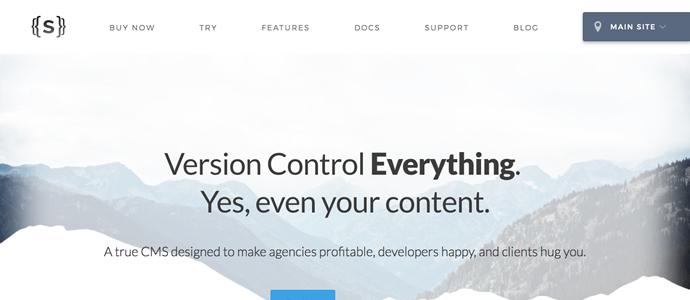
Statamatic is a fully featured proprietary CMS that can be a great option if you’re looking for a robust platform to build a site.
Statamatic is targeted at developers providing a variety of command line tools, version control, and lots of control over design elements to build highly customized sites.
And there are lots of tools for content creators and managers too. Statamatic makes use of a variety of content types, taxonomy capabilities, Markdown and more. This platform is a great fit for developers who are looking for fine-grained control without a lot of the burden that can sometimes come with other systems.
Statamatic is built on the Lavarel PHP framework, and has a templating system that focuses on providing control without having to write a lot of custom PHP.
- Technical level: advanced
- Hosted vs. self-hosted: self-hosted
- Cost: free for local development and evaluation, $199
Weebly

Another completely self-contained system, Weebly is another great alternative to WordPress if you are looking for an easy-to-use website builder and just getting started.
Weebly is very similar in its approach to other website builder platforms mentioned here, and makes getting started with your website very attractive for beginners who have more basic needs.
I wouldn’t recommend Weebly or its competitor Wix for more complex websites, but if you need a simple website this is definitely an option to look at.
- Technical level: Beginner
- Hosted vs. self-hosted: hosted
- Cost: free with premium upgrades
Wix

If you’re looking for something simple, then Wix may be the one for you. Wix is a pretty straight-forward program that’s attracted a lot of attention because of how easy it is to get started.
Wix is a great solution for those with basic needs who are looking for drag-and-drop simplicity and don’t want to worry about learning the technical side of building a website.
Its basic feature set is enough to get going with a starter site, but can be expanded to some additional features like ecommerce if you decide this is the platform for you.
Wix is a completely hosted platform, so everything you need for hosting is included in their service.
- Technical level: Beginner
- Hosted vs. self-hosted: hosted
- Cost: free with premium upgrades